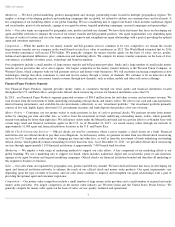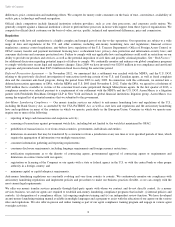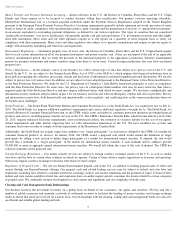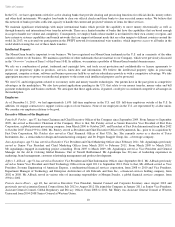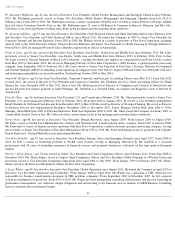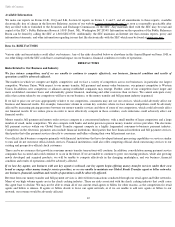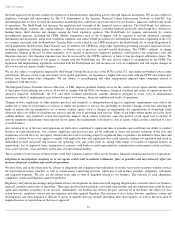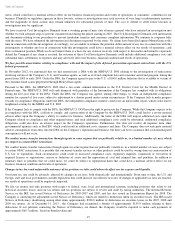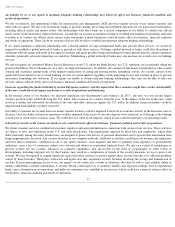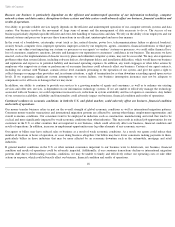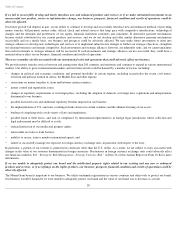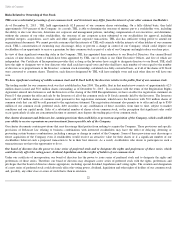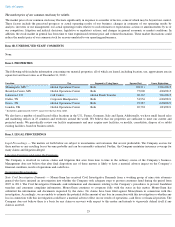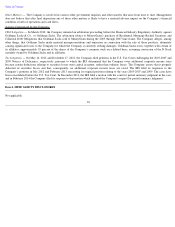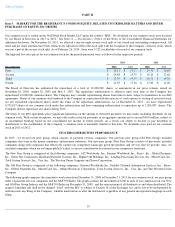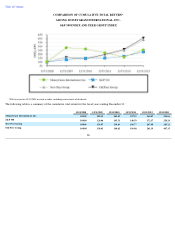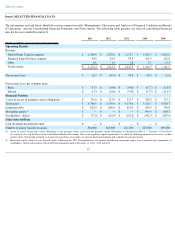MoneyGram 2013 Annual Report Download - page 19
Download and view the complete annual report
Please find page 19 of the 2013 MoneyGram annual report below. You can navigate through the pages in the report by either clicking on the pages listed below, or by using the keyword search tool below to find specific information within the annual report.
Table of Contents
An inability by us or our agents to maintain adequate banking relationships may adversely affect our business, financial condition and
results of operations.
We rely on domestic and international banks for international cash management, ACH and wire transfer services to pay money transfers and
settle with our agents. We also rely on domestic banks to provide clearing, processing and settlement functions for our paper-
based instruments,
including official checks and money orders. Our relationships with these banks are a critical component of our ability to conduct our official
check, money order and money transfer businesses. An inability on our part to maintain existing or establish new banking relationships sufficient
to enable us to conduct our official check, money order and money transfer businesses could adversely affect our business, financial condition
and results of operations. There can be no assurance that we will be able to establish and maintain adequate banking relationships.
If we cannot maintain a sufficient relationship with a limited number of large international banks that provide these services, we would be
required to establish a global network of banks to provide us with these services. Utilizing a global network of banks could alter the pattern of
settlement with our agents and result in our agent receivables and agent payables being outstanding for longer periods than the current remittance
schedule, potentially adversely impacting our cash flow. Maintaining a global network of banks may also increase our overall costs for banking
services.
We and our agents are considered Money Service Businesses in the U.S. under the Bank Secrecy Act. U.S. regulators are increasingly taking the
position that Money Service Businesses, as a class, are high risk businesses. In addition, the creation of anti-
money laundering laws has created
concern and awareness among banks of the negative implications of aiding and abetting money laundering activity. As a result, certain of our
agents have been denied access to retail banking services in certain markets regardless of the mitigating factors and controls in place to prevent
anti-
money laundering law violations. If our agents are unable to obtain sufficient banking relationships, they may not be able to offer our
services, which could adversely affect our business, financial condition and results of operations.
Concerns regarding the financial health of certain European countries, and the impact that these countries might have on the sustainability
of the euro, could adversely impact our business, results of operations and financing.
In the normal course of our business, we maintain significant euro denominated cash balances. In 2013
, the euro was our second largest
currency position in the world following the U.S. dollar. The secession of a country from the euro, or the demise of the use of the euro, could
result in a sudden and substantial devaluation of the euro and other currencies against the U.S. dollar. In addition, financial markets could be
impaired and bank liquidity could be restricted.
Our ability to generate fee revenue from our money transfer business could be impaired if the level of economic activity in the Eurozone were to
decrease. Our own ability to fund our operations could be impaired if our access to our euro deposits were restricted, or if damage to the banking
system were to result from a currency crisis. We could also lose value in our deposits, which in turn could be material to our operating results.
A breach of security in the systems on which we rely could adversely affect our business, financial condition and results of operations.
We obtain, transmit and store confidential consumer, employer and agent information in connection with certain of our services. These activities
are subject to laws and regulations in the U.S. and other jurisdictions. The requirements imposed by these laws and regulations, which often
differ materially among the many jurisdictions, are designed to protect the privacy of personal information and to prevent that information from
being inappropriately disclosed. Any security breaches in our computer networks, databases or facilities could harm our business and reputation,
adversely affect consumers’
confidence in our or our agents' business, cause inquiries and fines or penalties from regulatory or governmental
authorities, cause a loss of consumers, subject us to lawsuits and subject us to potential financial losses. We rely on a variety of technologies to
provide security for our systems. Advances in computer capabilities, new discoveries in the field of cryptography or other events or
developments, including improper acts by third parties, may result in a compromise or breach of the security measures we use to protect our
systems. We may be required to expend significant capital and other resources to protect against these security breaches or to alleviate problems
caused by these breaches. Third-
party contractors and agents also may experience security breaches involving the storage and transmission of
our data. If users gain improper access to our, our agents', or our contractors' systems or databases, they may be able to steal, publish, delete or
modify confidential customer information. A security breach could expose us to monetary liability and legal proceedings, lead to reputational
harm, cause a disruption in our operations, and make our consumers less confident in our services, which could have a material adverse effect on
our business, financial condition and results of operations.
17


